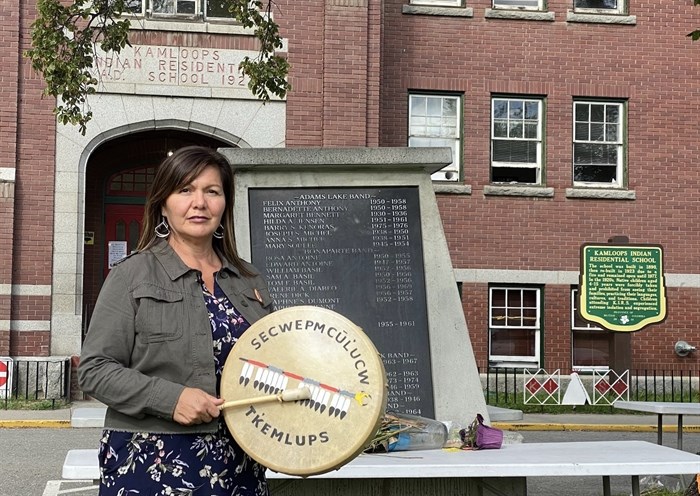
Kukpi7 (Chief) Rosanne Casimir stands in front of a memorial at the Kamloops Indian Residential School.
Image Credit: SUBMITTED/Tk'emlups te Secwepemc
May 27, 2024 - 6:00 PM
Three years after the announcement from Tk'emlups te Secwepemc echoed across the country, the First Nation continues to investigate what's beneath the soil near the Kamloops Indian Residential School.
"We are taking steps to ensure the investigation is carried out in a way that does not preclude and will not interfere with potential future legal proceedings," reads a May 27 statement from Kukpi7 (Chief) Rosanne Casimir.
The findings so far are being kept confidential to "preserve the integrity of the investigation," the statement continues.
"Our investigators' findings to date are consistent with the presence of unmarked burials. When we reach our next milestone, we will be sure to update you," Casimir's statement reads.
READ MORE: iN VIDEO: Lillooet man breaks intergenerational trauma cycle, gives back to community
So far, the investigation has included archival research, archaeological studies, "potential" DNA scans and other forensic methods, according to her statement. It also includes Wenecwtsinem, or "truth-telling," with survivors of the school.
Since the announcement in May 2021, Tk'emlups has referred to the ground penetrating radar discovery as a confirmation of something elders and former students knew. It was initially said to be the graves of 215 children at the site.
Archaeologist Sarah Beaulieu later said ground penetrating radar discovered around 200 probable graves, which came after the discovery of a child's rib bone and a tooth in the area. Tk'emlups now refers to the children as "Le Estwicwey," meaning "the missing."
The announcement rippled across the country, spurring a second reckoning with Canada's history and the Indian residential school system, years after the Truth and Reconciliation Commission. It also spurred similar ground penetrating radar work at other former residential schools.
Casimir said Tk'emlups knew there would be a "backlash" with the announcement.
READ MORE: First Nations blamed for delays on Tranquille redevelopment in Kamloops
"There have always been those who target Indigenous People in Canada, with systemic racism and white supremacy as foundational to Canada as the very laws that ripped our children away from home, in cattle trucks and police cars, to bring them to the residential schools," she said.
The Kamloops Indian Residential School was open from the 1890s to 1978. It housed children from 128 different communities, with around 500 students enrolled at its peak in the 1950s.
Tk'emlups is asking survivors or their family members to share their experiences as it continues to research.
To contact a reporter for this story, email Levi Landry or call 250-819-3723 or email the editor. You can also submit photos, videos or news tips to the newsroom and be entered to win a monthly prize draw.
We welcome your comments and opinions on our stories but play nice. We won't censor or delete comments unless they contain off-topic statements or links, unnecessary vulgarity, false facts, spam or obviously fake profiles. If you have any concerns about what you see in comments, email the editor in the link above. SUBSCRIBE to our awesome newsletter here.
News from © iNFOnews, 2024